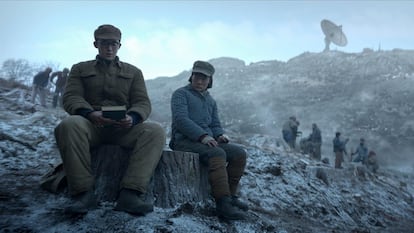The problem with ‘3 Body Problem’
Advertised as being from the creators of ‘Game of Thrones,’ the new Netflix series has been tagged with a misleading label that weighs a lot and means little

Shōgun — the original 1980 miniseries, by Richard Chamberlain and Toshirō Mifune — was born to be “the new Roots.” This referred to the tens of millions of viewers who tuned in to the iconic series about slavery, which was based on the 1976 novel Roots: The Saga of an American Family. After this phenomenon, producers became obsessed with capturing massive audiences by working off of a best-selling book.
Whenever a new show or movie comes out, there’s often an attempt to extract sequels from any previous success, sometimes based on misleading premises such as “the latest work by” or “from the creators of.” Series with so much personality — such as Murder One (1995-1997) or Picket Fences (1992-1996) — had a hard time shaking off being labeled as “the new Twin Peaks.” Even Northern Exposure was sold as “a Twin Peaks for normal people.” Not even the creator himself — David Lynch — was able to shake the legacy. Something similar happened with Lost, the franchise that constantly sought to repeat its own success. “From the creators of Lost” became a kind of condemnation for TV gems such as Fringe or The Leftovers.
Without the tagline “from the creators of Game of Thrones,” the Netflix series 3 Body Problem would just be another science fiction series based on a key novel from the genre (Apple TV has already produced three more as I write this column). Associating it with the HBO series may have aroused the curiosity of many viewers, but it’s a label that weighs a lot and means little.
Everything that was good about Games of Thrones was already in George R. R. Martin’s books, while everything that made us raise our eyebrows came from the show’s creators, Weiss and Benioff. Unfortunately, excessive creative licenses have also been allowed when it comes to 3 Body Problem (which I imagine were blessed by Netflix).
The first step that was taken while adapting the novel was to remove China as the setting (which also removed the theme of catastrophe management in totalitarian regimes, shown to us in productions such as Chernobyl). The second mistake in the creation of the Netflix series was leaving most of the action in the hands of a group of friends as homogenous as they are forgettable. If I don’t care about the action in the moment, how can I care about what happens in 400 years?
Those who have read the original novel by Liu Cixin say that the original Chinese version easily has more substance. And, if you aren’t satisfied with either work, allow me to recommend another fantastic series: Battlestar Galactica (the “new one”). In every sense, it also combines science fiction with politics and fanaticism, the great threats facing humanity. Even though it’s already 20-years-old, it seems it was written tomorrow. You won’t regret it, as they say.
Sign up for our weekly newsletter to get more English-language news coverage from EL PAÍS USA Edition
Tu suscripción se está usando en otro dispositivo
¿Quieres añadir otro usuario a tu suscripción?
Si continúas leyendo en este dispositivo, no se podrá leer en el otro.
FlechaTu suscripción se está usando en otro dispositivo y solo puedes acceder a EL PAÍS desde un dispositivo a la vez.
Si quieres compartir tu cuenta, cambia tu suscripción a la modalidad Premium, así podrás añadir otro usuario. Cada uno accederá con su propia cuenta de email, lo que os permitirá personalizar vuestra experiencia en EL PAÍS.
¿Tienes una suscripción de empresa? Accede aquí para contratar más cuentas.
En el caso de no saber quién está usando tu cuenta, te recomendamos cambiar tu contraseña aquí.
Si decides continuar compartiendo tu cuenta, este mensaje se mostrará en tu dispositivo y en el de la otra persona que está usando tu cuenta de forma indefinida, afectando a tu experiencia de lectura. Puedes consultar aquí los términos y condiciones de la suscripción digital.









































